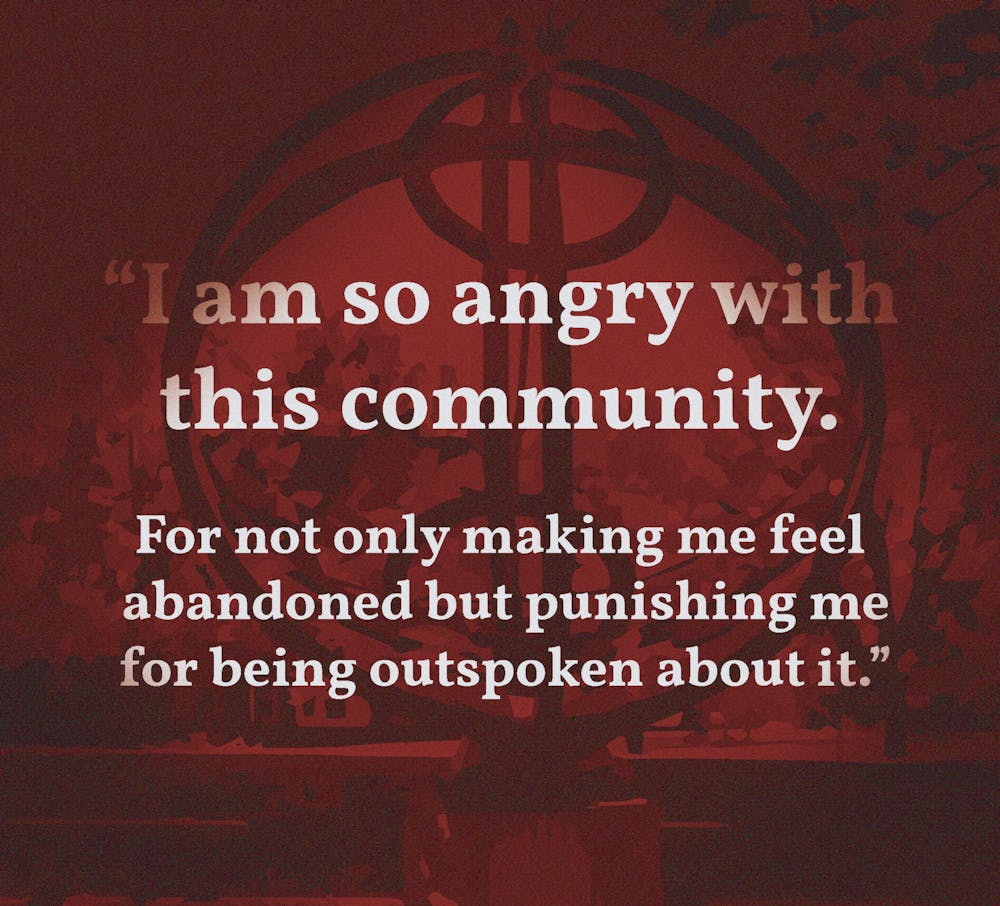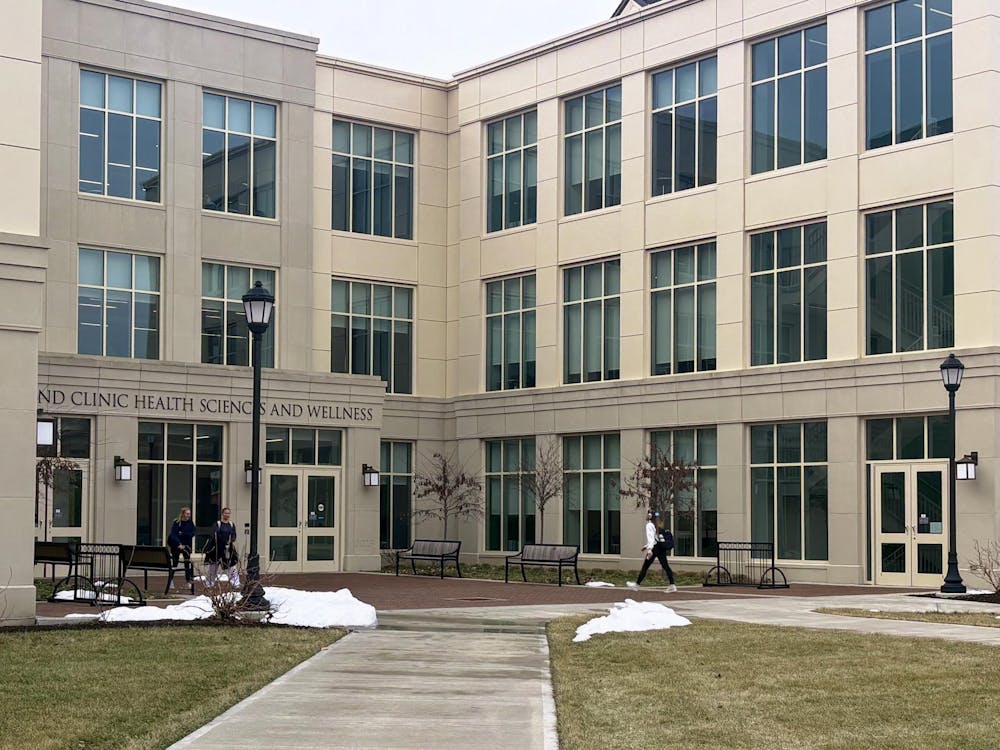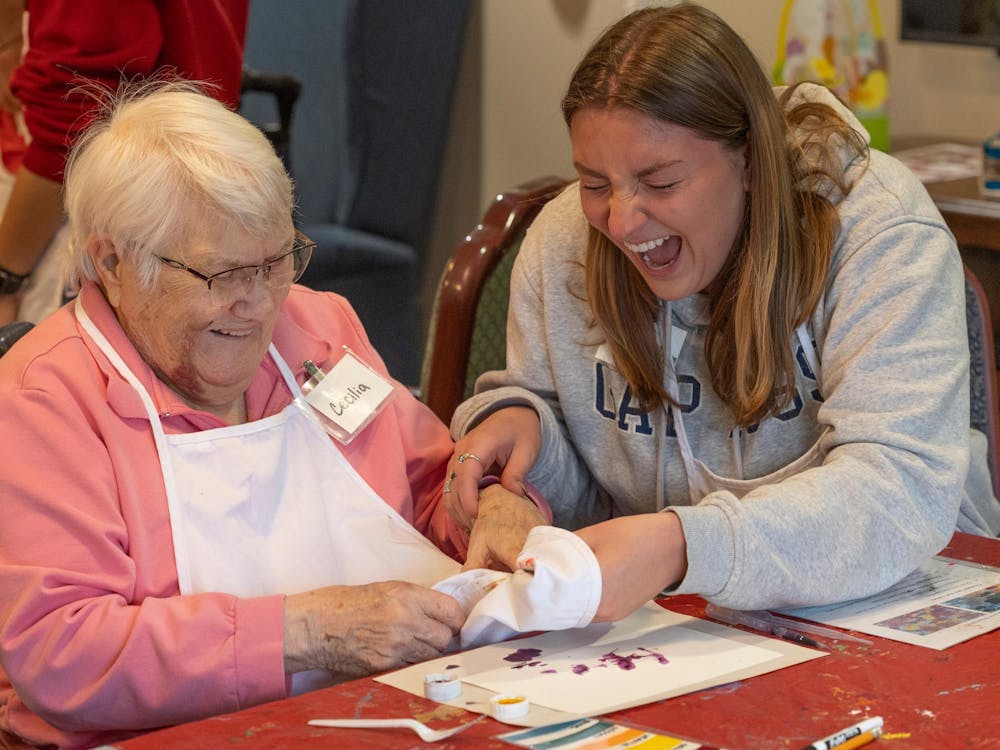Tatum Moleski came back to school excited. She was ready for all that her senior year had to offer. Soon, she would be applying for grants and working on getting her research published once again.
Like many other students, Moleski wanted to spend time with friends for her last Welcome Weekend as a Miami University student. She and her best friend at the time decided to go out the Saturday before classes began.
She danced at the Uptown bars and drank with her friend. At one point in the night, she was greeted by another close friend of hers and his Chi Psi fraternity brothers.
She got separated from the friend she had originally gone out with. She didn’t think anything of it, though. These people were familiar to her.
“I didn’t see a reason to be worried because it was like, ‘I know these guys,’ I’ve known some of them for awhile,” Moleski said. “We’ve been to formal together and parties. I didn’t have a reason to be worried.”
As the night went on, she found herself at a hookah lounge with around 15 other men. One by one, the people that she knew left the lounge, leaving her with two other men she didn’t know.
She recalls being asked by one of the men if she wanted to leave the lounge. She agreed, and he led her to his house. She fell asleep there but woke up the next morning knowing she had been sexually assaulted.
After the assault, she reached out to a friend and revealed what had happened to her, but was met with a negative response.
“When that's the first time telling someone about something that happened, it really sets the stage for how you feel going forward,” Moleski said. “So being told, ‘Oh, I don’t want to hear this,’ that really hurt.”
After receiving a negative reaction, she decided to hold everything in. She distracted herself by getting ahead on school work.
“I decided to bury it. I thought that’s what you should do,” Moleski said. “I thought, ‘Well this is my senior year, I don’t have time for this’ … And, for about two weeks, that worked. I got super far ahead in bio and physics because I just studied and studied.”
When the semester began, she started taking a class for her global health minor which focuses on the opioid epidemic.
Enjoy what you're reading?
Signup for our newsletter
In the class, she learned that women who end up using opioids have likely either been assaulted or abused as children. The longer she sat in the class, the more the thing she tried to bury so deep began to eat at her.
She built up the courage and told her professor, Cameron Hay, what happened to her, even though she knew that her professor was obligated to report it.
She received an email from the Title IX office within 24 hours of the report, which was attached with a PDF file that outlined all her available options. She described the PDF as being full of jargon and fine print.
Deputy Title IX Coordinator for Student Sexual and Interpersonal Violence Gabrielle Dralle then reached out to Moleski and introduced herself via email. Moleski eventually met with Dralle in person where they discussed her three main options: not to report, to report through the university or to pursue action through the Oxford Police Department (OPD).
Initially, she chose not to report and placed her focus on getting help through counseling. At Miami, students who are the victims of sexual assault can seek counsuling through Student Counseling Services (SCS), Women Helping Women and the Psychology Clinic. Students also have the option of reaching out to practitioners in the city of Oxford as well.
Moleski was nervous about receiving counseling through SCS because of her bad experiences with the counseling center in the past, but was willing to give it a second chance. When seeking counseling from SCS, students have the option of working with Dralle to schedule an appointment or calling themselves.
SCS has about five slots set aside each day for emergency appointments, and if a student indicates they are in crisis, they have the opportunity to meet with someone the same day, Director of Student Counseling Services John Ward said. The slots can be increased past the standard five, depending on student need.
Moleski chose to reach out to SCS herself and recalls having to call multiple times to get started with the process. She said she was presented with a few options when trying to set up an appointment — all required that she be put on a waitlist.
Frustrated with not being able to receive immediate help, she told the SCS receptionist that her situation was an emergency and that she was working with Title IX. She recalls being told by the receptionist that Title IX has no jurisdiction over SCS and that she couldn’t just be moved up the list because they say so.
“Me telling a faceless person over the phone that I was doing something with Title IX is basically revealing that I’ve been assaulted,” Moleski said. “I kind of blew up at that point. And I said ‘I was assaulted, and it’s taking for-fucking-ever to get any kind of resources.’”
Ward said SCS receptionists have been equipped with “long-standing guidelines” to interact with students who are working with Title IX and make sure they are given appointments in a timely manner.
After her phone call with SCS, Moleski then took her frustrations to social media, tweeting, “Really cool that after being assaulted it would take less time to learn how to drive, get my driver’s license, buy a gun, and shoot myself than it would to make an appt. at student counseling services!” while tagging the university and University President Greg Crawford.
Within minutes, The Division of Student Life reached out to Moleski via Twitter. Moleski was linked to resources and a counselor provided by the university. Moleski, grateful for the resources, was again frustrated that these weren’t presented to her initially and that it took a tweet to allow her to have access to them.
“Why wasn’t this presented to me upfront?” Moleski asked. “For me, I’ve found that a lot of my life has been about being loud so that I can get that the things that I need. Being quiet is a privilege.”
Ward also said that SCS is working on adding to their staff, but he sees the importance of informing students of the potential wait times.
“I wouldn’t want to not mention to a student that we do have a delay for ongoing individual counseling,” Ward said. “A student goes through an initial consultation, meets with that counselor, then gets to the end of that session and finds out that there is a delay before they can get onto individual counseling. Because some students may say, ‘Well why didn’t you tell me that upfront? I could have gone somewhere else for service as opposed to spending time here.’”
Moleski has found speaking with Dralle, Hannah Kuethe and Mady DeVivo from Women Helping Women to be helpful. She said she's appreciated the authentic conversations she’s had with them.
Because she spoke openly about her assault, Moleski’s friends reached out to her and said they were going to seek help for themselves. On the particular day her friends went to reach out to the resources she suggested, Dralle, Kuethe and DeVivo were out of their office.
Moleski blames the university for the lack of resources.
“[It’s] not because they're bad at their jobs,” Moleski said. “That’s because Gabby, Hannah and Mady are all [individual] people. It’s a lot that we’re asking for a few people to be doing. And it’s very heavy work, too.”
Dralle acknowledges that she has a busy schedule, but makes time in her schedule to accommodate student needs.
“I do this work with a sense of urgency,” Dralle said.“I want to be able to give students support and the needs that they have answered. I do work in the evenings, I work through my lunch sometimes, but that’s just who I am.”
Moleski acknowledges that there are a large volume of sexual assaults that are not reported and thinks that if the majority of them were reported, the university wouldn't be able to accomodate all of them.
“I don’t think this campus is really prepared for the sheer volume of how many assaults that there really are,” Moleski said. “Even if a quarter of the people that have been assaulted step forward and said ‘I want resources,’ I think [Miami] would be extremely overwhelmed.”
Since her assault, Moleski says her attacker has been kicked out of his fraternity but he hasn’t experienced an extreme interruption to his life.
“Besides being kicked out of the frat, my attacker has lived a very normal life,” Moleski said. “It’s just business as usual for him.”
She had her first hearing through the university on Thursday, Nov. 7. There, she provided clarifying details about her case but was not asked to recount anything traumatic. If there is enough evidence found, another hearing will be held to determine her attacker’s status at the university.
“I'm losing a semester of school. A suspension would be fair,” Moleski said. “If I had to miss out of school, [he] should, too.”
Moleski said that students should have a conversation and know the toll a sexual assault can have on a student afterward.
“[I] did not know that I would go days without sleeping or days without eating,” Moleski said, “That I would have the kind of nightmares where I would wake up and shake. I didn’t know that I wouldn’t want my hair cut because I didn’t want anyone to touch me. It needs to be emphasized — all the ways it can screw up your life.”
Moleski will take a medical leave for the rest of the semester. Since her assault, she has missed academic opportunities such as the application date for her research grant and has had anxiety over potentially losing her scholarships (although she has since learned her scholarships are secure). She is frustrated because she feels the university put her academic future at risk and caused hardships in her personal life.
“I am so angry with this community. For not only making me feel abandoned but punishing me for being outspoken about it.”
She said she hopes her message will get through to those in the administration to create avenues to get sexual assault survivors more immediate resources from the university.
“I feel like me being upset out in the open is important because this is real,” Moleski said. “It’s not something that you can ignore.”




